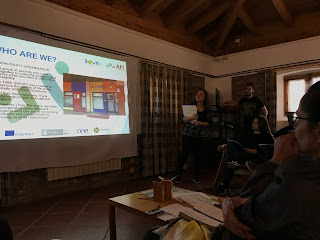Last Day

Our seminar has sadly come to an end. After a week of hard work and learning, we had to say our goodbyes. However, before doing so, we set aside some time for the portugese team to facilitate one last dance workshop.It was really beautiful to see the kind of work we could produce together after spending a week of building partnerships. All of the participants were even blindfolded to create an atmosphere of concentration. Later in the day we all sat down together and shared our plans for future collaborations together. In that aspect, the seminar was quite a success because every team is very excited to create future projects togther! Lastly, we discussed the youth pass and everyone received their Art for Inclusion Certificate!





